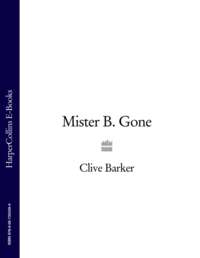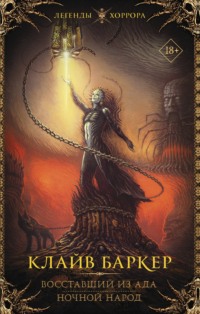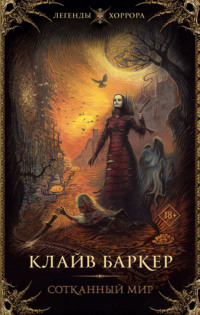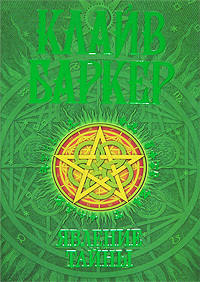
Полная версия
Abarat
Candy bit her tongue and got up. Her chair made an ugly squeal as she pushed it back. There was more nervous laughter from one or two places around the class, but mostly there was silence, even from the loquacious Deborah Hackbarth. Nobody wanted to draw Miss Schwartz’s venomous attention in their direction right now.
“And pick up your workbook, Quackenbush,” Miss Schwartz said. “I want you to explain your defacing of school property to the principal.”
Candy didn’t argue. She dutifully went down on her haunches and gathered up all the things that Miss Schwartz had knocked off her desk: the pencils, the pens, the workbook and the paper on Henry Murkitt.
“Give that stupid paper and the workbook to me,” Miss Schwartz said.
“I’m not going to destroy them,” Candy protested.
“Just give them to me,” Miss Schwartz demanded, her voice almost cracking with rage.
Candy put the pens and pencils down on her desk and gave the book and paper to Miss Schwartz. Then—without looking around at the rest of the class—she made her way to the door.
Once she was outside the classroom in the eerie hush of the corridor, she felt a peculiar sense of relief. She knew she should be feeling full of regret and self-recrimination, but the truth was that a significant part of her was glad she’d said what she’d said. Miss Schwartz had picked on her one too many times.
She was a ridiculous woman anyway, with her endless snide remarks and her ludicrous obsession with chickens.
“Who cares about chickens?” Candy said, her voice echoing down the empty passageway.
The door at the end of the corridor was open. Through it she could see the sunlit yard, and beyond the yard the school gate and the street. It would be so easy, she thought, just to walk out of here right now and never have to hear Miss Schwartz pontificate on the Glories of Chicken Farming ever again.
What was she thinking? She couldn’t do that. She’d be expelled for certain.
So what? said a voice at the back of her head. Just walk out. Go on. Walk out.
For some reason, the doodles that she had drawn in her workbook came back into her mind. Only this time, instead of being black lines on gray, recycled paper, they were bright in her mind; very bright. And all kinds of colors, the way the sun appeared in your mind if you looked at it for a moment and then closed your eyes. Dozens of little suns: green and red and gold; then colors, too, that you couldn’t even name. That was the way the lines looked in Candy’s mind’s eye.
And they were moving. The wavy lines were rolling across the darkness inside her skull, rolling and breaking, the brilliant colors bursting into arabesques of white and silver.
Behind her she heard a familiar sound: the click, click, click of Miss Schwartz’s heels.
“What are you still doing in the corridor, Candy Quackenbush?” she yelled down the corridor. “I told you to report to the principal’s office.”
Everyone in the classes along the passage had heard the woman, Candy knew. Tomorrow she’d be the butt of every idiotic joke. Candy glanced over her shoulder. Miss Schwartz was gaining on her, her arms crossed in front of her bosom. Held captive behind them was the evidence for the prosecution: Candy’s workbook and the paper on Henry Murkitt. Poor Henry Murkitt, sitting in that cold little room in the hotel, waiting with his sextant for a ship to come and find him. Checking the stars, consulting his watch. Waiting and waiting until he could stand the wait no longer.
Candy looked away from Miss Schwartz, her gaze returning to the rectangle of brightness at the end of the corridor.
And still the lines rolled on in her mind’s eye. Rolled and broke. Rolled and broke.
“Where do you think you’re going?” Miss Schwartz demanded.
Candy’s feet knew, even if her brain was a little slow at catching up with the idea. They were taking her out of here.
“You head right back to the principal’s office!” Miss Schwartz called after her.
Candy didn’t really hear the woman’s words very clearly now. The lines in her head were making a sound, like the din of white noise on an untuned television. It washed away Miss Schwartz’s demands.
“Candy Quackenbush! Come back here!”
Her shrill voice was being heard from one end of the school to the other, but the person to whom they were directed was deaf to them.
Out she went, with Miss Schwartz pursuing her, inventing new threats and demands to throw in Candy’s direction. Candy took no notice of them.
She stepped over the threshold and out into the bright morning.
A little portion of her mind still said: Candy, turn around. What are you doing? They’ll expel you for certain, but the voice was too small to convince her feet.
At the threshold, she broke into a run. It took her thirty seconds to reach the school gate and get out into the street.
A few students caught sight of her as she made her departure. Those who knew her said they’d never seen Candy Quackenbush looking happier.
4
“ STREET ENDS ”
THE BRIGHT ROLLING DOODLE stayed in Candy’s mind’s eye, even though her feet had obeyed its instruction and carried her out through the school gates and into the street. She briefly thought about going home, but the notion didn’t stay in her head for long. She had no desire to be back in Followell Street. Though her mom would be at work, her father would be up and about by now, and he’d want to know why she had returned from school in the middle of the morning.
So she walked in the opposite direction: down Spalding Street to the intersection with Lennox; over Lennox and on toward the Comfort Tree Hotel on Stillman Street. She had half a thought to call in at the hotel and tell Norma Lipnik exactly what had happened when she’d tried to tell the sad story of Henry Murkitt. Perhaps she could even persuade Norma to lend her the passkey so that she could go back up to Room Nineteen and look at the sextant again. Hold it in her hands and examine it; see if she got a clearer picture of poor Henry’s last hours when she did so.
But once she got to the hotel, she found the desire to see the sextant was not as important as another desire, one which she could not name or comprehend, but which kept her going, on past the hotel to the intersection of Stillman and Lincoln.
Here, for a moment, she stopped. The streets were busy in both directions, at least busy for Chickentown. There were four or five cars waiting at the lights every time they turned red. One of the drivers was Frank Wrightson, who had been a drinking buddy of her father’s until six months before, when they’d had a big falling-out. It had ended in a shouting match outside the house and a few blows half-heartedly exchanged. The men had not spoken to each other since.
“Hey, Candy!” Frank yelled as he drove by.
She waved, trying not to look too guilty for being out in the street in the middle of a Thursday morning.
“No school today?” Frank yelled.
Candy was just trying to figure out a way to answer this without lying to Frank Wrightson, when the woman in the car behind his truck honked her horn to hurry him on his way. Returning Candy’s wave, he drove off.
Which way now? she thought. She couldn’t wait at the intersection forever.
And then the decision was made for her. A gust of wind came down Stillman Street from the direction of the chicken factory. It stank of chicken excrement and worse. I’m not going to take Stillman Street, she thought to herself. So that left Lincoln. Without another thought, she turned the corner, and as soon as she’d done so she knew that was the decision she was supposed to make.
Not only did the foul smell disappear almost completely, but there—at the far end of the street, where Lincoln ran out of houses and gave way to the prairie—was a cloud, vast and shaped like some enormous flower, blossoming as the wind carried it south, away from town.
For some reason the sight of it—its golden color, its shape, its sheer size—put everything she’d left behind—Miss Schwartz and her stupidities, Deborah Hackbarth and the rest, even the smell on Stillman Street—out of her head.
Smiling as she walked, she headed on past the hotel and on down Lincoln Street toward the cloud.
The wavy lines in her head began to fade now, as though they had done their job by getting her out wandering until she came in sight of this blossom-cloud. She’d seen it; she had her destination.
The houses were thinning out now as she approached the end of Lincoln Street. She could remember venturing so far in this direction only once before, and that was because Patti Gibson, who’d been her best friend three years ago, had brought her down here to show her one of the few memorable front lawns in Chickentown. It had belonged to an old woman by the name of Lavinia White, known to all as the Widow White. In place of flowers, Lavinia had “planted” plastic pinwheels in the grass, the kind constructed of brightly colored plastic that made a whirring sound when the wind spun them. No doubt the Widow White was a little bit crazy, because she hadn’t simply put three or four of these things in her garden; she’d planted hundreds, in place of ordinary flowers. Some bright scarlet, some eye-pricking green, some striped or spiraled. It had been quite a sight, Candy remembered.
To her astonishment she found that they were still there. She heard them before she saw them, the massed noise of their whirring coming to meet her down Lincoln Street. When she came in sight of them, she found that they were all rather the worse for wear. Clearly the Widow White had not replaced the pinwheels with new ones over the last few seasons, and many had been knocked over by the wind, or had lost their plastic blooms, and she’d simply left the sticks in the dirt. But perhaps one in three of them remained operational, and that still provided a bizarre spectacle.
Candy glanced up at the house itself as she passed, and there in the upper window, sitting in a wheelchair watching the world go by (or as much of the world as would pass by the last house in the street before the grasslands began) was old Widow White herself. She had her eyes on Candy, so Candy gave her a wave and a smile. The Widow White returned neither.
There was no barricade or fence at the end of the street. Just a sign, placed at the limit of the asphalt that stated, with absurd redundancy:
STREET ENDS
“Oh really?” said Candy, looking up at the sign. Beyond it, there was just rolling prairie and the cloud. It had grown in size in the time that Candy had taken to walk the length of Lincoln Street, and it was no longer moving away from town. The wind had changed direction, and now seemed to be coming from the north. It had a curious tang to it, which was not the smell of the factory and its clotted drains. She didn’t know what it was.
She glanced back over her shoulder down the length of Lincoln Street. From here it was a half-hour walk home, at least. If the great gilded cloud was bringing rain, then she was going to get wet on her way back to Followell Street. But she had no desire to start the homeward trek, not for a little while, at least. She had no idea of what lay ahead of her besides the wild hills and the long grass, and the orange milkweed, the larkspur, and prairie lilies in among the grass.
But walking for a while where nobody (except the Widow White) knew she’d gone was better than going home to listen to her father in the first stages of the day’s drinking, raging on about the injustices of his life.
Without another thought she walked on past the STREET ENDS sign, catching it with her palm as she went so that it rocked in the shallow hole some lazy workman had made for it, and headed out into the gently swaying grass.
Butterflies and bees wove ahead of her, as if they were showing her the way. She followed them, happily. When next she looked back, the shoulder-high grass had almost obscured Chickentown from sight. She didn’t care. She had a good sense of direction. When the time came for her to find her way back, she’d be able to do just that.
Her eyes glued to the great swelling mass of the cloud, she walked on, her griefs and humiliations left somewhere behind her, where the road ended and the ocean of grass and flowers began.
Конец ознакомительного фрагмента.
Текст предоставлен ООО «ЛитРес».
Прочитайте эту книгу целиком, купив полную легальную версию на ЛитРес.
Безопасно оплатить книгу можно банковской картой Visa, MasterCard, Maestro, со счета мобильного телефона, с платежного терминала, в салоне МТС или Связной, через PayPal, WebMoney, Яндекс.Деньги, QIWI Кошелек, бонусными картами или другим удобным Вам способом.











